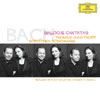Bach Dialogue Cantatas
Some impressive moments but overall the new Quasthoff set disappoints
View record and artist detailsRecord and Artist Details
Composer or Director: Johann Sebastian Bach
Genre:
Vocal
Label: Deutsche Grammophon
Magazine Review Date: 13/2007
Media Format: CD or Download
Media Runtime: 0
Mastering:
Stereo
DDD
Catalogue Number: 477 6591GH

Tracks:
| Composition | Artist Credit |
|---|---|
| Cantata No. 57, 'Selig ist der Mann' |
Johann Sebastian Bach, Composer
Berlin Baroque Soloists Dorothea Röschmann, Soprano Johann Sebastian Bach, Composer Rainer Kussmaul, Zedlau Thomas Quasthoff, Baritone |
| Cantata No. 152, 'Tritt auf die Glaubensbahn' |
Johann Sebastian Bach, Composer
Berlin Baroque Soloists Dorothea Röschmann, Soprano Johann Sebastian Bach, Composer Rainer Kussmaul, Zedlau Thomas Quasthoff, Baritone |
| Cantata No. 49, 'Ich gehe und suche mit Verlangen' |
Johann Sebastian Bach, Composer
Berlin Baroque Soloists Dorothea Röschmann, Soprano Johann Sebastian Bach, Composer Rainer Kussmaul, Zedlau Thomas Quasthoff, Baritone |
Author: Jonathan Freeman-Attwood
This is the second of Thomas Quasthoff’s Bach collaborations with this period-informed, modern-instrument ensemble, following a highly personal and distinctive disc of the great solo bass cantatas (1/05). “Dialogue Cantatas” with soprano Dorothea Röschmann is generally a less enduring affair, although it contains moments of infectious immediacy and genuine insight.
Bachians have long celebrated the richness of the Yuletide cantata Selig ist der Mann, where one fine aria follows another as the librettist uses St Stephen’s martyrdom as an emblem of sacrifice and ultimate reward. Bach relishes the interaction between the Soul and Christ, especially when the final aria comes to a surprisingly abrupt halt on “what is your gift to me?”, at which point the chorale answers with a beguiling invitation to discipleship.
Quasthoff takes a little time to find his bearings here. His unsure intonation and presence are unrecognisable from the compellingly visceral and engaged passagi of “Ja, ja, ich kann die Feinde schlagen”, in which the singer (Vox Christi) scatters the insolent foe for the fearful Soul. While Röschmann delivers performances of repeated colour, subtle nuancing and commanding shape in the little-known BWV152, Quasthoff again falls short of his best.
Alongside the spontaneous “hauteur” of Elly Ameling and Hermann Prey (for Helmut Winschermann – Philips, nla) and the deeply moving account with Agnes Giebel and Barry McDaniel (for Werner – Erato, 1/05), this BWV57 is not a serious contender. The chirpy Ich geh und suche mit verlangen (BWV49) is slightly more successful in its sense of interaction but even Röschmann rather gets the blues here also. Go to Christophe Coin (Astrée – nla) to hear this quietly ingenious piece in its most uplifting and sympathetic guise.
Bachians have long celebrated the richness of the Yuletide cantata Selig ist der Mann, where one fine aria follows another as the librettist uses St Stephen’s martyrdom as an emblem of sacrifice and ultimate reward. Bach relishes the interaction between the Soul and Christ, especially when the final aria comes to a surprisingly abrupt halt on “what is your gift to me?”, at which point the chorale answers with a beguiling invitation to discipleship.
Quasthoff takes a little time to find his bearings here. His unsure intonation and presence are unrecognisable from the compellingly visceral and engaged passagi of “Ja, ja, ich kann die Feinde schlagen”, in which the singer (Vox Christi) scatters the insolent foe for the fearful Soul. While Röschmann delivers performances of repeated colour, subtle nuancing and commanding shape in the little-known BWV152, Quasthoff again falls short of his best.
Alongside the spontaneous “hauteur” of Elly Ameling and Hermann Prey (for Helmut Winschermann – Philips, nla) and the deeply moving account with Agnes Giebel and Barry McDaniel (for Werner – Erato, 1/05), this BWV57 is not a serious contender. The chirpy Ich geh und suche mit verlangen (BWV49) is slightly more successful in its sense of interaction but even Röschmann rather gets the blues here also. Go to Christophe Coin (Astrée – nla) to hear this quietly ingenious piece in its most uplifting and sympathetic guise.
Discover the world's largest classical music catalogue with Presto Music.

Gramophone Digital Club
- Digital Edition
- Digital Archive
- Reviews Database
- Full website access
From £8.75 / month
Subscribe
Gramophone Full Club
- Print Edition
- Digital Edition
- Digital Archive
- Reviews Database
- Full website access
From £11.00 / month
Subscribe
If you are a library, university or other organisation that would be interested in an institutional subscription to Gramophone please click here for further information.




